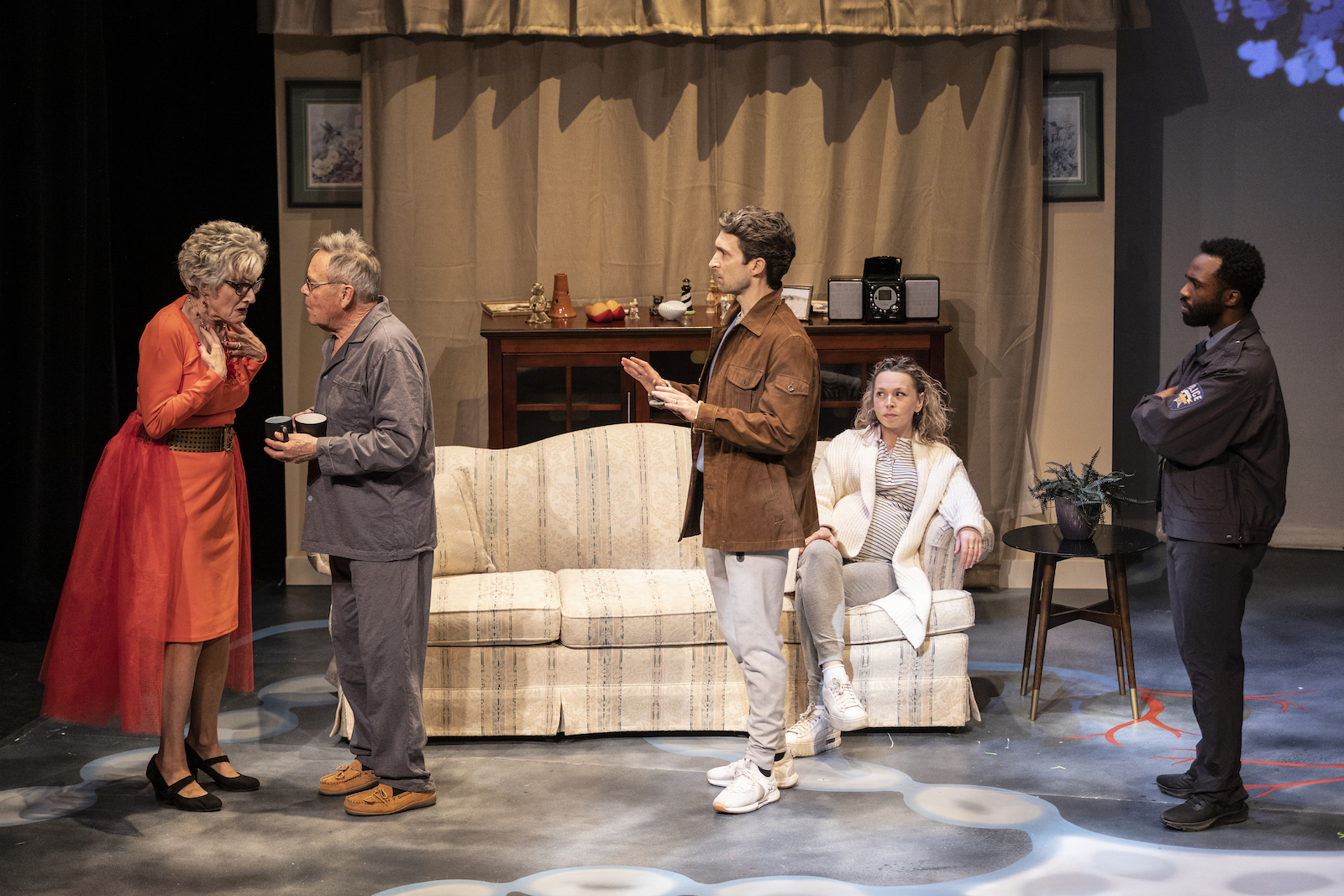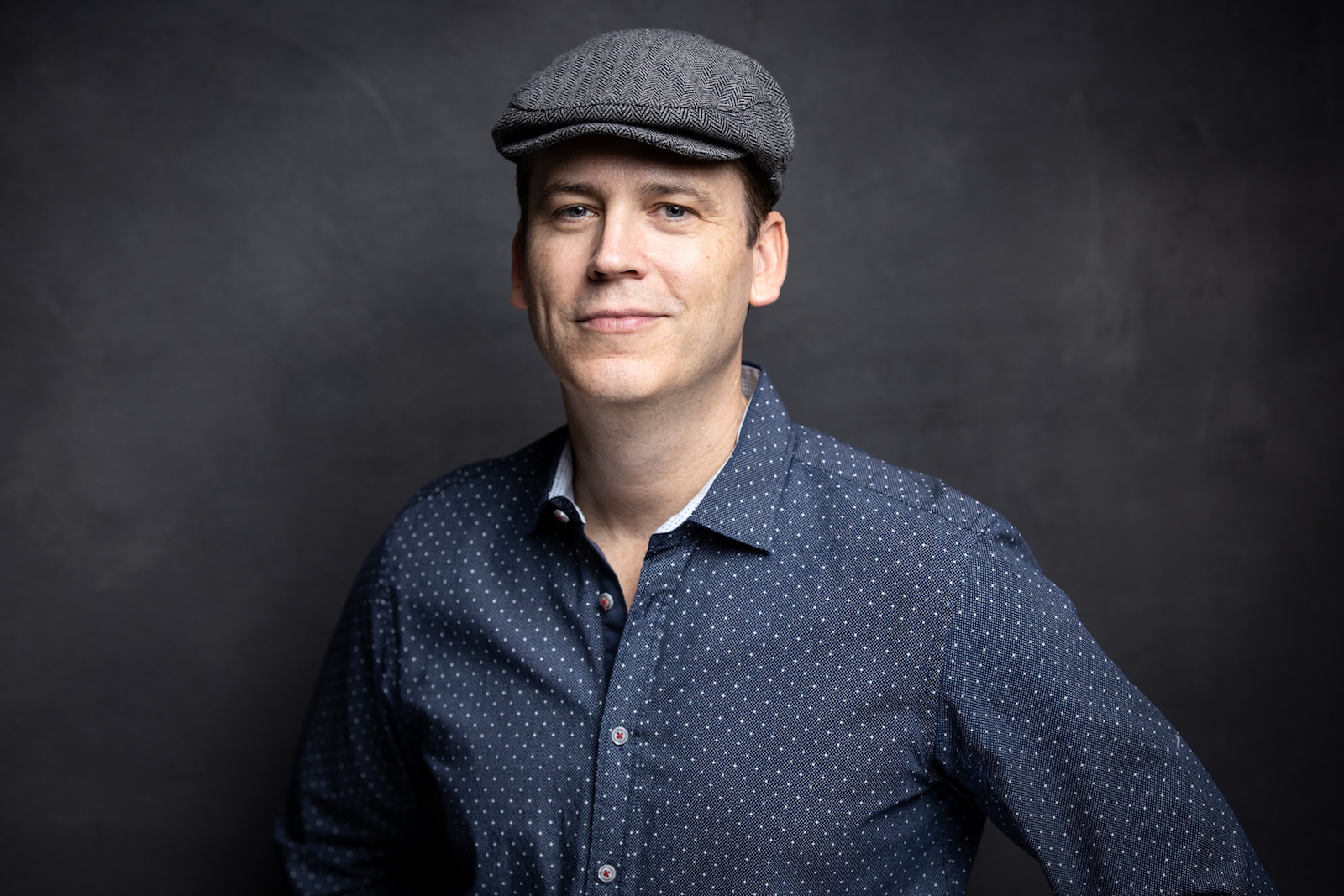Aaron Craven never planned to be an actor. He also never planned to juggle a busy career and a young family while caring for his parents after their simultaneous diagnoses of dementia—and then write a play about the whole experience. But that’s exactly what happened. “It’s exhilarating but it’s terrifying,” he says about seeing his first full-length script, Instantaneous Blue, performed in front of an audience.
On this grey late-November morning, the day after a 15-centimetre snowfall caused chaos throughout Vancouver, schools have declared a snow day, much to the delight of Craven’s young son. It’s quiet and chilly inside the Working Actors Gym, Craven’s acting studio tucked away in a nondescript building on Keefer Street. He steers me away from what he calls an uncomfortable couch, pulling two chairs out of a carefully arranged semicircle instead, then plugs in a space heater and brews tea.
Craven doesn’t recall any career aspirations as a child. “Probably all the usual: firefighter, astronaut, all that kind of stuff,” he says. Standing over six foot two, he has the easy demeanour and instant likeability of someone who has spent decades in a profession where first impressions matter a lot.

Aaron Craven in The Bletchley Circle: San Francisco.
It was a high school drama teacher who first noticed his potential and cast him in a play, ignoring Craven’s protestations that he was a jock, not an actor. “That was my first discovery of the hit of adrenaline of being in front of a crowd,” he says. But, coming from a “very non-creative, very civil servant, very blue-collar” background, it didn’t occur to him to pursue an acting career.
As an “aimless, hard-drinking first-year university student” dabbling in pre-law at UBC, Craven signed up for a few theatre classes and drifted gradually into a theatre major. After graduating and taking a year off for “the whole 20-something discovery time,” he landed an agent. Roles on stage and screen followed, including recurring parts in TV series such as Stargate SG-1, The L Word, iZombie, Travelers, and The Bletchley Circle: San Francisco. Thanks to his busy schedule, he splits his time between Vancouver and Los Angeles.
While in his 20s, Craven drifted into acting coaching, too. His peers recognized his talent for helping them prepare for auditions and encouraged him to start an acting class. He also founded Mitch and Murray Productions and has directed both plays and short films for the production company. The newest addition to his resume is playwright, a career trajectory that can be traced back to one heartbreaking visit to a doctor’s office.
The year was 2016, and Craven had been called in to speak to his parents’ physician. “You need to get your mom tested. I think she has Alzheimer’s,” the doctor told him. Craven says it was a lightbulb moment, when his mother’s increasingly erratic behaviour—such as calling the police repeatedly to report a non-existent intruder—suddenly made sense. But then the doctor dropped a second bombshell: “I think your dad’s headed down that path, too.” Craven pulled over on the way home from the doctor’s office and bawled.
Looking back, he realizes his parents had been concealing signs of cognitive decline for some time. “I was wondering why they were eating so much pizza,” he says. With a mix of love and exasperation, he imagines his father’s thoughts as his mother became unable to prepare meals: “Oh, I don’t need to call a doctor or get a cognitive check. I need to just get some pizza every night!”
His father’s dementia progressed quickly, and he passed away in 2018 at age 83. Craven was working on a film set when his wife called with the news. “I had to finish the night on set,” he says. “It’s in the play. Spoiler alert.”
For Craven’s mother, the decline has been longer and more difficult, what Craven refers to as “the long goodbye.” He describes an incident when she slipped away from the homecare aide. “She left the house and was wandering through the Downtown Eastside, and the police had to go find her,” he says. Craven’s wife also drove around the city, searching, with their newborn baby strapped in the backseat.
Craven says his stubborn mother, a retired nurse, “wouldn’t take help. She wouldn’t take people in her home, messing with her stuff. That’s all in the play.” After she became abusive toward the homecare worker, Craven called 811 for help. “They said: best thing to do is take her to the hospital and get her into the geriatric ward, and that can be a transition step to maybe get her on some sedatives and medications, to then get her into care.”
He followed the advice. For 10 hours, he sat with his mother in the noise and chaos of the St. Paul’s Hospital emergency room—“last place you want somebody with dementia to be.” He urged the staff to admit her before she started to sundown, which occurs with many dementia patients late in the day: pacing, wandering, hallucinating, becoming aggressive, having difficulty understanding people.
“Sure enough, five o’clock, six o’clock rolls around. I can’t explain anymore to Mom what we’re doing here. I’ve been lying all day, saying we’re just here to check your heart,” Craven recalls. When she announced she was leaving, a nurse called security to restrain her and force her into a hospital gown.
As Craven describes what happened next, anger bubbles to the surface: “Four security guards strap her to a bed as she’s screaming her head off. Strip her naked and get her into a gown while she’s screaming and crying for her father. And she’s screaming repetitively, ‘Not in front of the men! Not in front of the men!’ Because they’re all male, and some part of her brain knew, ‘Don’t undress me in front of the men.’ I remember that phrase specifically.”
Craven was better informed than most people about the challenges that overworked hospital staff face—his mom had been a nurse, after all—but still the ordeal infuriated him. “I don’t know what it is in me, my Scottish temper or sense of justice or what,” he says. “I thought, oh my god, I have to do something. I can’t let other people go through this. So I went to the press. I wrote an open letter. And my phone started ringing.”
“Sometimes you have to be a voice for the voiceless.”
First it was the Vancouver Sun, which ran an article about him. Then it was the Alzheimer Society, which interviewed him and asked him to work as an advocate, an arrangement that led him to conscript several actor friends and create short videos for the Dementia-Friendly Canada project. More surprising was the call asking him to meet with the planners of the new St. Paul’s to provide input on how people with dementia should be admitted to hospital.
“Sometimes you have to be a voice for the voiceless,” he says. “We want to give people agency, but people in that state, they don’t have any agency left.”
The difficulties didn’t end once Craven’s mother was in care. During the early days of the pandemic, when visitors weren’t allowed, the staff tried to use video calls to connect mother and son. It just confused her. “I’d be on the screen and she’d be like, ‘Where’s Aaron?’” Craven could tell her mental health was plummeting.
As her only relative, he requested special permission to visit. He lobbied hard—or as he puts it, “bitched and complained and screamed”—until Vancouver Coastal Health made an exception and granted him an essential-visitor pass. Before being allowed in, he had to take a COVID test and don head-to-toe PPE. “I remember coming into the room, looking like I was in a science fiction movie.” But his mother recognized him, and his visit helped her. “If there’s another pandemic in our lifetime,” he says, “we have to look at mental health on the same level as we look at physical hygiene,” particularly for seniors.
Now 83, Craven’s mother is still living in care. “She’s a tough old bird,” he says affectionately. Though she can no longer walk, and her speech is slurred and rambling, she manages the occasional moment of connection with her son. He describes a recent visit in which she startled him by clearly saying his name. “I knelt down beside her and said, ‘Yeah, Mom, what’s going on?’ She was like, ‘I love you so much.’”
“You’re going to make me cry,” I protest to Craven.
“Well, don’t watch the play!” he says with a laugh. “Your connection to your family, it somehow holds on when everything else just kind of crumbles.”

The cast of Instantaneous Blue. Image courtesy of Shimon Photo.
Craven would also like to see changes to the way people with power of attorney (POA) can help their aging parents. He recounts hours of bouncing around on the phone, repeating the same information to an endless stream of customer-service agents as he tried to organize his parents’ finances and sell their home. The time and effort required under the current POA system, he says, is like an extra part-time (or, occasionally, full-time) job: “It’s a broken system.” His recommendation? “We need to create some kind of universal POA card, that’s like a healthcare card.” He says, “I don’t want the next generation of people to live through what I had to.”
During the most intense and stressful period for Craven, he sometimes found himself negotiating with realtors and signing legal documents on his phone—all between takes on a film set—while worrying about being a good husband, father, and son. “Your world can become so insular,” he says. “I think in those few years, friendships, long-term planning, vacations, all of that just left. All you can do is just go day to day, hour to hour, problem-solving and trying to manage. That’s something that people don’t tell you about getting older.” Throughout the toughest moments, Craven’s biggest support has always been his wife. “I couldn’t have done this without her, no question. I tell her as much as I can. Probably not enough.”
It was after his father died that the idea of writing a play sparked. “I can either take this experience and I can just be bitter and somewhat traumatized, or… I’m a storyteller. I have a theatre company. We’ve never done an original work before.” He’d spent more than 20 years “breaking scripts down as an actor, learning what works, what’s extraneous, how to build a scene, how to keep an audience held.”
But he also had worries. “My situation was unique. It’s really rare to have two parents simultaneously go through this.” He asked himself, “Even though it actually happened, would an audience believe it?”
Judging by audiences’ emotional reactions to early staged readings of Instantaneous Blue, Craven has nothing to be concerned about. And for anyone who fears that a show about dementia is relentlessly bleak and depressing, Craven reassures me it has plenty of humour. “It’s ultimately about a family.”
Talking about live theatre, he becomes especially passionate. “My first love is the stage. You get that instant feedback. The pressure of it I really enjoy,” he says. “It’s one of the last places where you’re supposed to put your phone away for an hour, just be in the moment, not be distracted, just absorb.” He appreciates that in theatre, unlike film, an audience’s reaction can affect the performance. And, he argues, a live performance can provoke a more visceral response than a filmed one.

Aaron Craven in Snowflake.
“I remember doing Snowflake last year.” He gestures to the wall, where a poster for the production hangs. “There was this quieter part toward the end of the play, where it was a pretty painful moment between the father and daughter. I remember just hearing the sound of this woman gently sobbing,” he says. “That’s the power, clearly.”
When Craven looks ahead, he sees many more live theatre productions in his future, along with film and television work, both in front of and behind the camera. He’s shopping around the script for a TV pilot. He plans to adapt Instantaneous Blue into a screenplay. What he’s trying not to do is obsess about getting dementia himself. “I’m probably in denial,” he says with a laugh—though he’s made sure his paperwork is already in order, just in case.
And he feels a renewed sense of hope for theatre. “The last two years have reminded us that we can’t get everything on Uber and Netflix,” he says. “The arts have always continued—through wars, through pandemics. They’re so important. We’ve been telling stories around the fire since the dawn of time.”
Craven says he wouldn’t wish his experience on anyone but that it has expanded his powers of empathy. If you make changes to help other people, “then the experience you’ve gone through isn’t just pain. You’ve taken it and morphed it and translated it into something of value. And you can live with a little bit more peace when you do that.”
As I don my many warm layers, ready to brave the wintry Vancouver weather again, Craven puts our two chairs back in the tidy semicircle. The room is once again ready for a class of actors eager to hear Craven’s words of wisdom about acting and auditions—and possibly much more.
Instantaneous Blue runs January 6 to 22 at the Waterfront Theatre. Read more local arts stories.









